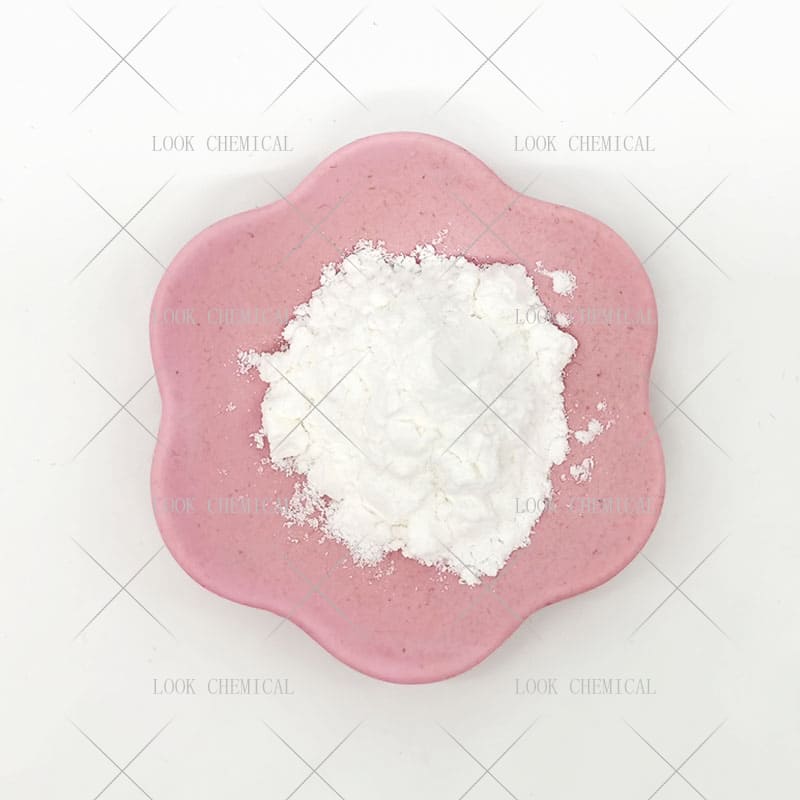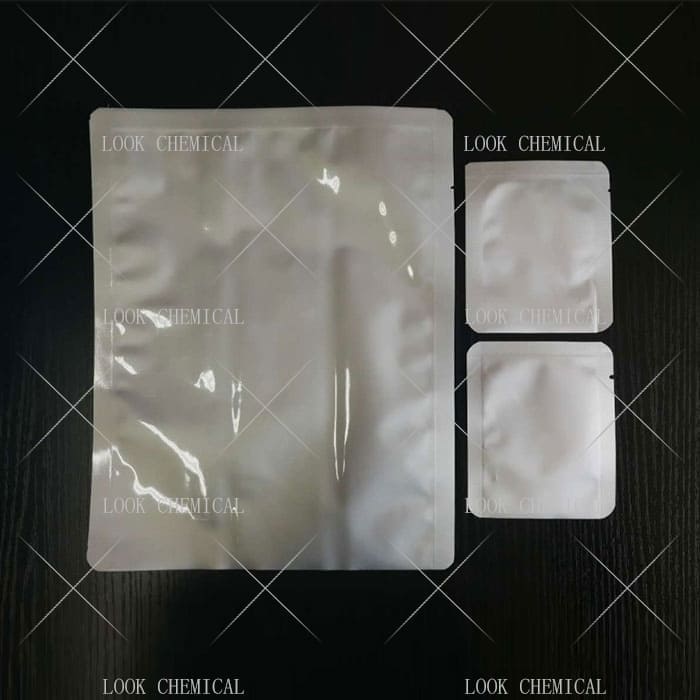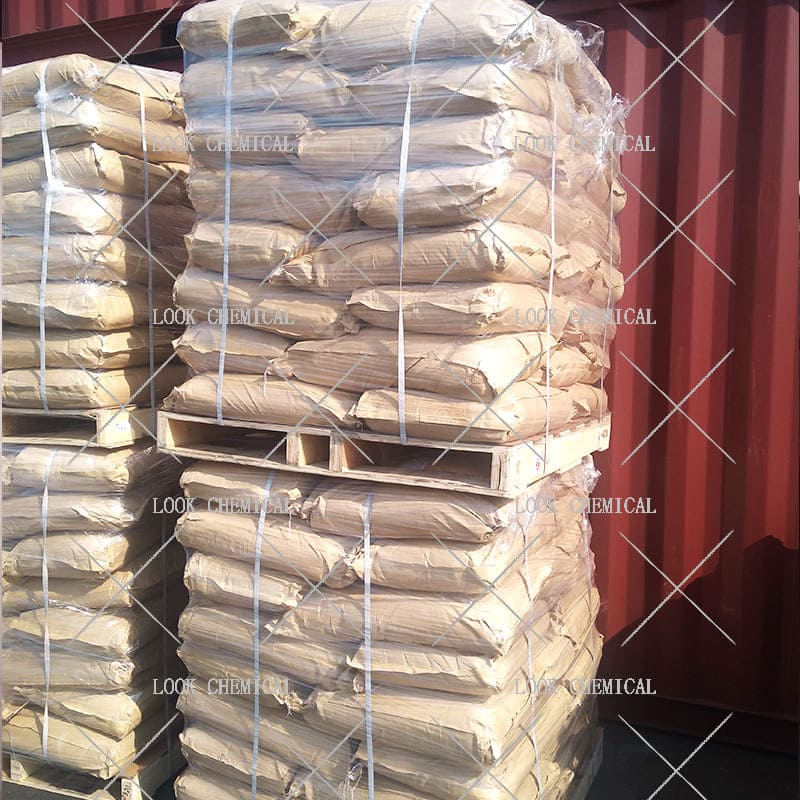Sodium Thiosulfate CAS 7772-98-7

Sodium Thiosulfate CAS 7772-98-7 with Free Sample
- Appearance:Powder
- Purity:99.8%
- Delivery:30days
- Sample Available:Available
- Payment:L/C,T/T,D/P,Paypal,Money Gram,Western Union
- Incoterm: FOB,CFR,CIF,EXW,FCA,CPT,CIP
- Transporta:Ocean, Land,Air, DHL,TNT FedEx
Name: Sodium Thiosulfate
CAS: 7772-98-7
MOQ: 1KG
Directory Guidance on Sodium Thiosulfate
Chemical Structure
Basic Info:
| Melting point | 48°C |
| Boiling point | 100°C |
| density | 1.01 g/mL at 25 °C |
| storage temp. | Store at +5°C to +30°C. |
| solubility | Immiscible with alcohol. |
| form | Solid |
| Specific Gravity | 1.667 |
Product Introduction:
Sodium Thiosulfate (Na₂S₂O₃) is an inorganic compound that usually exists in the form of white crystals or granules. It is easily soluble in water and the solution is neutral or slightly alkaline. It has strong reducing properties and can reduce many chemical substances to low-valent elements. It is relatively stable in the air, but will gradually decompose under humid conditions and release harmful gases, so humid environments need to be avoided during storage. In addition, its solution easily decomposes at high temperatures to generate gases such as sulfur and sulfur dioxide.
From a chemical perspective, Sodium Thiosulfate has strong reducing properties, which makes it used as a reducing agent in many chemical reactions. It can react with chlorine, chloride, hydrogen peroxide and other substances to reduce their oxidation state. For example, during the metal extraction process, it can reduce metal cyanide complexes and release precious metals, thereby realizing the recovery of gold, silver and other metals. In addition, Sodium Thiosulfate is also widely used in water treatment, photography and development and other fields, especially in the removal of cyanide and chloride in water.
A significant advantage of Sodium Thiosulfate is its relatively stable chemical properties, especially in aqueous solutions. When it reacts with many toxic gases and chemicals, it can effectively neutralize these harmful substances and reduce environmental pollution. For example, in wastewater treatment, it can reduce cyanide in water, making it non-toxic. In addition, its reducing effect on nitrate and chlorine makes it widely used in the field of environmental protection.
Sodium Thiosulfate also has certain application value in medicine and food industry. Medically, it is used as an antidote to treat cyanide poisoning by reacting with cyanide to form non-toxic compounds. In food processing, it is used as a preservative, which can effectively inhibit the growth of bacteria and mold and extend the shelf life of food. Its stability and good solubility make it excellent in these applications without causing significant side effects in humans.
Nature and Specifications:
| Item | Specification |
| Product Name | Sodium Thiosulfate |
| CAS No. | 7772-98-7 |
| Appearance | Powder |
| Shelf Life | 2 years |
| Packing | As your requirements |
| form | Solid |
| Specific Gravity | 1.667 |
| color | White |
| PH | 6.0-8.5 (25℃, 50mg/mL in H2O) |
| Water Solubility | Soluble in water. Insoluble in alcohol. |
| Sensitive | Hygroscopic |
Product service:
- Certificate Of Analysis (COA)
- Material Safety Data Sheet (MSDS)
- Route of synthesis (ROS)
- Method of Aanlysis (MOA)
- Nuclear Magnetic Resonance (NMR)
- Packing pictures and loading video before loading
- Free Sample
- Factory audit
Sodium Thiosulfate (Na₂S₂O₃) is a widely used chemical substance. With its reducing property and high stability, it has been widely used in many fields, including chemical industry, environmental protection, medicine, food processing, etc.
1. Metal smelting and precious metal extraction
Sodium Thiosulfate has important applications in the field of metal smelting, especially in the extraction of precious metals. When extracting precious metals such as gold and silver, it can form complexes with metal cyanides, help decompose metal cyanides, and improve the recovery rate of precious metals.
For example, in the cyanide extraction process of gold, it can reduce the cyanide metal gold ions and release them, thereby improving the extraction efficiency. This process is more environmentally friendly than the traditional cyanidation method, reducing the use and emission of cyanide and reducing the risk of environmental pollution.
2. Photographic development
Sodium Thiosulfate is widely used in the traditional photography industry, especially in the development process of black and white photography. As one of the components of the developer, it can effectively remove unexposed silver halide and fix the image that has already appeared. Its role here is to react with unexposed silver halide, reducing it to colorless silver, so that the image on the photographic film can be fixed. Its reducing effect makes it one of the key chemicals in photography, especially in film photography and printing industries.
3. Water treatment and environmental protection
In the field of water treatment, Sodium Thiosulfate is widely used in wastewater treatment and environmental protection, especially in removing toxic substances such as cyanide and chloride from water. Cyanide is a common industrial wastewater pollutant, especially in metal smelting and precious metal extraction.
Sodium Thiosulfate can effectively reduce cyanide and convert it into non-toxic substances, ensuring that the cyanide concentration in the wastewater meets the discharge standard. In addition, it can also remove free chlorine in water and prevent chlorine from polluting the water body. Therefore, it plays an important role in the water treatment industry, especially in the treatment of heavily polluted industrial wastewater.
4. Medical application
Sodium Thiosulfate is used as an antidote in the medical field, especially for the treatment of cyanide poisoning. When the human body is poisoned, cyanide reacts with it to produce non-toxic thiocyanate, which effectively neutralizes the toxicity of cyanide.
Cyanide poisoning usually occurs when exposed to cyanide or cyanide compounds (for example, certain chemicals or smoke contain cyanide). In emergency treatment, it is used as an antidote and can quickly relieve the toxicity of cyanide by intravenous injection.
In addition, Sodium Thiosulfate is also used in other types of poisoning treatment, such as poisoning of certain metal ions, such as chloride ion poisoning. It neutralizes harmful substances through reduction reactions to achieve the effect of detoxification.
5. Food Industry
Sodium Thiosulfate is mainly used as a preservative and antioxidant in food processing, and is widely used in the processing and storage of some foods. In the drying process of some fruits and vegetables, it is used to prevent oxidation, maintain the freshness and color of food, and extend its shelf life.
For example, in the processing of raisins and other dried fruits, it is used as a preservative to reduce the growth of microorganisms. In addition, it can also be used for bleaching and color preservation of sugars and some foods to prevent food from discoloration and mold.
6. Chemical analysis
In chemical experiments and analysis, Sodium Thiosulfate is often used as a reducing agent or titrant, especially when analyzing the chlorine content in water. It can effectively help laboratories to perform accurate quantitative analysis by reducing chlorine gas or oxides.
For example, in the analysis of chlorine, Sodium Thiosulfate can be used as a standard solution for titration to determine the chlorine content in the sample. In addition, it is also used in many other redox reactions and is widely used in various analytical tasks in chemical laboratories.
7. Textile and papermaking industry
In the textile and papermaking industry, Sodium Thiosulfate also has certain applications. It is often used as a reducing agent in these industries to help remove color or treated dyes from textiles and paper. It can remove or convert oxidized substances in dyes into harmless forms by reducing them, thereby achieving post-processing of products and improving quality and appearance.
8. Agriculture
In agriculture, Sodium Thiosulfate also has certain uses, mainly as a reducing agent for agricultural chemicals. It can effectively reduce the toxicity of certain ingredients in pesticides and fertilizers and help improve soil quality. It is also used to remove heavy metal pollution in the soil and reduce the possibility of crops absorbing harmful substances, thereby improving the safety and sustainability of agricultural production.
In short, Sodium Thiosulfate plays an important role in multiple industries and fields due to its strong reducing property, stability and wide application. Its versatility makes it an indispensable chemical in modern industry and environmental protection.
When using Sodium Thiosulfate, although it has a wide range of applications in many fields, you also need to pay attention to the following aspects to ensure safety and effectiveness:
1. Storage and preservation
Sodium Thiosulfate should be stored in a dry, cool and well-ventilated place, avoiding humid environments. Because under humid conditions, it is easy to decompose and release harmful gases such as sulfur dioxide (SO₂), which is harmful to the environment and health. Therefore, it should be sealed during storage to prevent contact with moisture in the air.
2. Prevent excessive use
As a reducing agent, Sodium Thiosulfate has strong reducing properties, and the amount should be strictly controlled when used. Excessive use may cause excessive reactions, excessive by-products or harmful gases, and even cause certain harm to the human body and the environment. In medicinal and food processing, its usage is usually clearly specified and must be operated in accordance with standards.
3. Compatibility with other chemicals
Sodium Thiosulfate has strong reducing properties, so you need to be careful when it comes into contact with many chemicals (such as oxidants, acidic substances, etc.). For example, it should not be mixed with strong oxidants (such as chlorine, hydrogen peroxide, sodium chlorate, etc.), because these chemicals may react violently with it, causing the risk of fire or explosion.
4. Avoid inhalation and contact with skin
When using Sodium Thiosulfate, its dust or solution should be avoided from direct contact with the skin, eyes or inhalation. If accidentally contacted, it should be immediately rinsed with plenty of water. If dust or solution is accidentally inhaled, it should be moved to a well-ventilated place as much as possible and seek medical help.
5. Precautions in medical applications
In medicine, Sodium Thiosulfate is often used for the detoxification of cyanide poisoning, but strict dosage requirements should be followed when using it. Excessive use may cause adverse reactions such as hypotension, allergic reactions, etc., so it needs to be used under the guidance of professional medical personnel. In addition, before use, confirm that the patient is not allergic to it to avoid allergic reactions.
Contact Us
Product picture:



Product Package picture:


Related References:
chemicalbook-Sodium Thiosulfate
Sodium Thiosulfate Manufacturer
Contact Us
As an experienced Sodium Thiosulfate manufacturer and supplier, Look Chemical is committed to producing and selling high quality products.
We cooperate and trade with 6000+ factories around the world, and our high-quality products and excellent services make us enjoy a high reputation internationally.
As Sodium Thiosulfate CAS 7772-98-7 supplier, Look Chemical provides supply chain solutions to partners and customers in a wide range of industries. We offer competitive pricing and quality products.
If you have a demand for this product, please contact our company’s sales staff, we will provide you with a solution in the shortest time.
Transport proposal

1. For products ≤50kg, we recommend using express delivery, which is usually called DDU service (discounted, convenient).
2. For products ≤500kg, we generally recommend air freight, which is usually called FOB, CFR or CIF service (fast and efficient).
3. For products >500kg, we generally recommend shipping by sea, which is usually called FOB, CFR or CIF service (economical, safe).
4. For high-value products, please choose air or express to ensure the safety of product transportation.
Shandong Lookchemical service:
* Timely reply and 24 hours online, the professional team will provide you with the most favorable prices and high-quality products.
* The sample supports testing and inspection.
* Each batch of products will be tested to ensure that its quality meets user needs.
*Packaging can also be made according to customer requirements.
*Any inquiries will be answered by our relevant personnel within 24 hours.
*We will provide you with commercial invoice, packing list, packing list, COA, health certificate and certificate of origin if you need it. If your market has other special requirements, please let us know.
*We will monitor the logistics information in real time and will share the information with you.
* You can consult us at any time if you have any questions about the product, and we will answer you in time.
*If you have any questions about the product, you can report it to us, we will deal with it in time for you, and the product can be returned.
Frequently Asked Questions(FAQ):
We will make samples before mass production, and after sample approved, we’ll begin mass production. Doing 100% inspection during production, then do random inspection before packing.
Our MOQ is 1kg. But usually we accept less quantity such as 100g on the condition that sample charge is 100% paid.
Yes. We’ll give you product analysis report before shipping.
Different quantity has different discount.
Yes. Welcome to visit.
You can get free samples for some products,you only need to pay the shipping cost or arrange a courier to us and take the samples. You can send us your product specifications and requests,we will manufacture the products according to your requests.

